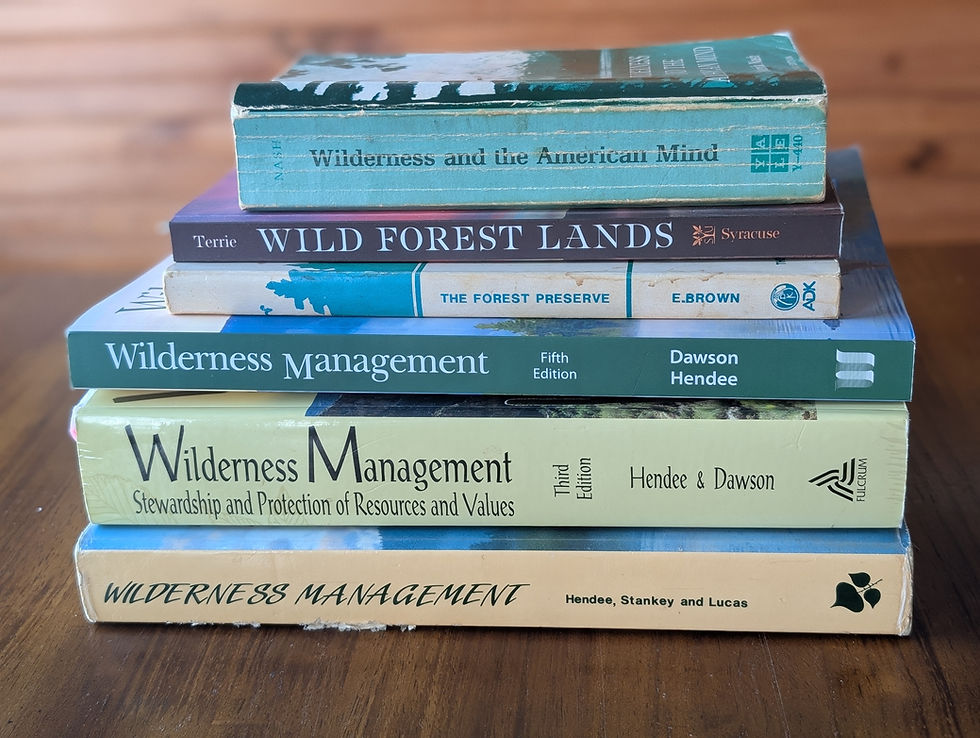A voice in the Wilderness
- jkdrury
- May 6, 2025
- 3 min read
Anyone who knows me or regularly reads this column knows I have special reverence for Wilderness.
Wilderness with a capital W is “official,” as designated by either federal or state government. The federal definition was largely written in the early 1960s by Howard Zahnizer during his visits to the Adirondacks. There are four elements to the definition that make it so special: It is natural, with minimal signs of humans; it’s untrammeled by humans, which implies a state of freedom and unhindered action; humans are visitors, we don’t live in Wilderness; and finally, my favorite: It’s a place with opportunities for solitude.

Wilderness areas are places where visitors can experience a sense of remoteness and separation from the stresses and distractions of daily life. Central Park doesn’t meet those criteria… nor for that matter does Cascade Mountain on a summer weekend.
Contrary to what some think, I wasn’t born in the wilderness with a compass as a pacifier. In fact, I’ll let you in on a secret if you don’t tell anyone ‒ I was born in Manhattan, although I never lived there. It was when I first visited the Adirondacks in 1956 that I started to fall in love with the outdoors. In 1970, only six years after the Wilderness Act was passed, I attended my first NOLS course and started to understand what Wilderness was. But it wasn’t until my senior year in college, when reading a summary of the final report of the Temporary Study Commission on the Future of the Adirondacks that I started to understand how special Wilderness is.
In recent months I’ve become greatly concerned about how our federal wildlands might be in danger. Every President, from Lyndon Johnson who signed the Wilderness Act of 1964 to Donald Trump has added to the National Wilderness Preservation System. Protecting wildlands is one thing; managing them properly, however, is another.
Massive layoffs of National Park employees in the name of saving money, yet at the same time giving large tax breaks to the wealthy, is hypocritical, tragic, and models the worst kind of leadership. The park rangers, scientists, land managers and other staff ensuring our parks thrive are essential if we are to maintain the quality of outdoor recreation Americans deserve.
Two executive orders to expand logging across federal forests, under the pretense of enhancing national security, will substantially weaken environmental protections, while at the same time greatly benefit corporate interests.
The administration has also unveiled permitting procedures to fast-track oil, gas and mining projects on national public lands. The process sharply curtails public participation and environmental review. The changes, issued under a declared “National Energy Emergency,” will allow the Department of the Interior to bypass key safeguards. These moves ignore the fact that the country is currently at record levels of production of fossil fuels. These actions are venal, sanctimonious, and could do the nation irreparable harm.
For these and a myriad of other reasons I’m reminded of the dramatic confrontation between Joseph Welch, special counsel for the U.S. Army, when he lashed out at Senator Joseph McCarthy during hearings on whether communism had infiltrated the U.S. armed forces. McCarthy came to fame by alleging that communists and Soviet spies had infiltrated the United States government, allegations which proved to be largely false.
Welch said, “I think I never really gauged your cruelty, or your recklessness…You've done enough. Have you no sense of decency, sir, at long last? Have you left no sense of decency?”
It marked the end of McCarthy’s power during the anticommunist hysteria of the 1950s.
I think it’s time someone in congress asks these same questions today.







Comments